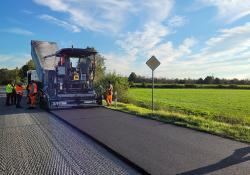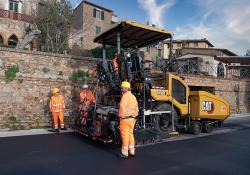The issue concerns several quarries along the route that have not been given the go-ahead from local the Wek'e'zhii Land and Water Board. So far no action has been taken against the Northwest Territories Department of Infrastructure, lead agency on the project. Discussions are ongoing.
Construction started last autumn on the two-lane road from Highway 3 to Whatì, an isolated town of around 500 mostly indigenous people in central Northwest Territories and about 165km north of the territory capital Yellowknife. The gravel road will replace a seasonal gravel road. Heavy trucks will be able to use the new road which will have a speed limit of 70kph. It will also allow better access to several large mines along its route.
The water licence and land-use permit were issued to the territorial government’s Department of Infrastructure for the public-private partnership contract of around US$316 million.
The Tlicho All-Season Road Project is notable for being the first P3 deal in Canada with an indigenous government holding an equity stake, according to a report by the CBC - Canadian Broadcasting Corporation. The Tlicho Government has a 20% ownership in the project.
Construction is by North Star Infrastructure, a consortium of Kiewit Canada Development and the Tlicho government – an indigenous regional authority, along with Peter Kiewit Sons ULC, Hatch Corporation and Thurber Engineering as design and engineering partners.
Federal government agency Infrastructure Canada is providing 25% of the $165 million construction cost. North Star will operate the route for 25 years after it opens in the winter of 2021 or early 2022. At the end it will be handed to the Northwest Territories government.
Quarrying for the project requires geotechnical analysis to ensure the material to be quarried does not pose a risk of chemicals or heavy metals leaching into the ground.
Other environmental issues have cropped up including food waste left around work camps that might attract wildlife, such as bears, as well as a spill of 15,000 litres of grey water but which was quickly contained. In the northern regions of Canada, the environment is particularly sensitive because of slow decay and recovery rates due to the ground being frozen for much of the long winter.













